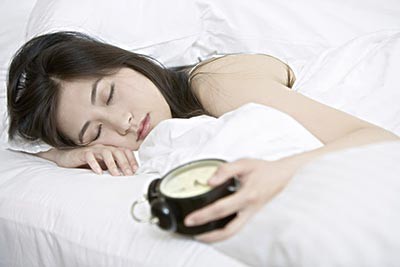(单词翻译:单击)

How much sleep is enough? If you get less sleep than the ideal amount but you feel fine, could you be damaging your health anyway? Are we getting less than we used to? Recent research provides some surprising answers。
美国《新闻周刊》撰文:多长时间的睡眠时充足的?如果你的睡眠时间比理想的睡眠时间少,但你感觉正常,这是否仍会损害你的健康?我们的睡眠时间比过去少了吗?最近的研究提供了一些令人吃惊的答案。
Adults typically need seven to nine hours of sleep each night to feel fully rested and function at their best. However, Americans are getting less sleep than they did in the past. A 2005 National Sleep Foundation poll found that Americans averaged 6.9 hours of sleep per night, which represents a drop of about two hours per night since the 19th century, one hour per night over the past 50 years, and about 15 to 25 minutes per night just since 2001.
成年人通常每晚睡7到9个小时才能感到恢复彻底、状态良好。然而,美国人的睡眠时间与过去相比越来越少。全国睡眠基金会在2005年的一次调查中发现,美国人平均睡眠时间为每晚6.9个小时,与19世纪相比,每晚减少约2小时,与50年前相比,每晚减少1小时,甚至与2001年相比也减少了约15至25分钟。
Unfortunately, we are not very good at perceiving the detrimental effects of sleep deprivation. Researchers at the University of Pennsylvania restricted volunteers to less than six hours in bed per night for two weeks. The volunteers thought they were functioning relatively normally. However, formal testing showed that their cognitive abilities and reaction times progressively declined during the two weeks. By the end of the two-week test, they were as impaired as subjects who had been awake continuously for 48 hours。
遗憾的是,我们没有很好地意识到睡眠不足的不良影响。宾夕法尼亚大学的研究人员要求志愿者在两周时间内每晚睡眠时间少于6小时。尽管这些志愿者在两周后认为他们的身体运转相对正常,然而,测试表明,两周时间里,他们的认知能力和反应时间逐渐下降。到测试结束时,他们健康受损程度与那些48小时不睡觉的实验对象是一样的。

Moreover, cognitive and mood problems may not be the only consequences of too little sleep. Researchers at the University of Chicago have shown that too little sleep changes the body's secretion of some hormones. The changes promote appetite, reduce the sensation of feeling full after a meal, and alter the body's response to sugar intake—changes that can promote weight gain and increase the risk of developing diabetes。
不仅如此,睡眠过少的后果可能不只是认知能力和情绪问题。芝加哥大学的研究人员已经证明,睡眠过少能够改变体内某些激素的分泌。这些变化会促进食欲,削弱对宝饱食的感觉,并改变身体对糖类摄入量的反应,导致体重增加,增加患糖尿病的风险。
A study by Susan Redline and colleagues at Case Western Reserve University School of Medicine showed an inverse correlation between sleep duration and obesity in high-school-age students. The shorter the sleep, the higher the likelihood of being overweight, with those getting six to seven hours of sleep more than two and a half times as likely to be overweight as those getting more than eight hours。
由凯斯-西部保留地大学医学院的苏珊-雷德兰及其同事进行的一项研究显示,高中生的睡眠时间与肥胖程度呈反比。睡眠时间越短,超重的可能性就越大,睡眠时间为6到7个小时的学生身体超重的可能性事睡眠超过8小时的那些学生的2.5倍以上。
The good news is that these effects can be reversed by getting an adequate amount of sleep. The University of Chicago study on sleep duration and appetite found that allowing the study subjects to sleep 10 hours for two consecutive nights returned the hormones to normal levels and lowered hunger and appetite ratings by almost 25 percent。
好消息是,充足的睡眠可以抵消这些影响。研究发现,让实验对象连续两天睡10个小时可以把激素水平恢复到正常,饥饿感和食欲水平下降近25%。


